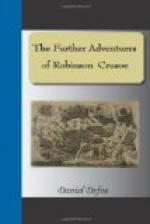I farmed upon my own land; I had no rent to pay, was limited by no articles; I could pull up or cut down as I pleased; what I planted was for myself, and what I improved was for my family; and having thus left off the thoughts of wandering, I had not the least discomfort in any part of life as to this world. Now I thought, indeed, that I enjoyed the middle state of life which my father so earnestly recommended to me, and lived a kind of heavenly life, something like what is described by the poet, upon the subject of a country life:-
“Free from vices, free from care,
Age has no pain, and youth no snare.”
But in the middle of all this felicity, one blow from unseen Providence unhinged me at once; and not only made a breach upon me inevitable and incurable, but drove me, by its consequences, into a deep relapse of the wandering disposition, which, as I may say, being born in my very blood, soon recovered its hold of me; and, like the returns of a violent distemper, came on with an irresistible force upon me. This blow was the loss of my wife. It is not my business here to write an elegy upon my wife, give a character of her particular virtues, and make my court to the sex by the flattery of a funeral sermon. She was, in a few words, the stay of all my affairs; the centre of all my enterprises; the engine that, by her prudence, reduced me to that happy compass I was in, from the most extravagant and ruinous project that filled my head, and did more to guide my rambling genius than a mother’s tears, a father’s instructions, a friend’s counsel, or all my own reasoning powers could do. I was happy in listening to her, and in being moved by her entreaties; and to the last degree desolate and dislocated in the world by the loss of her.
When she was gone, the world looked awkwardly round me. I was as much a stranger in it, in my thoughts, as I was in the Brazils, when I first went on shore there; and as much alone, except for the assistance of servants, as I was in my island. I knew neither what to think nor what to do. I saw the world busy around me: one part labouring for bread, another part squandering in vile excesses or empty pleasures, but equally miserable because the end they proposed still fled from them; for the men of pleasure every day surfeited of their vice, and heaped up work for sorrow and repentance; and the men of labour spent their strength in daily struggling for bread to maintain the vital strength they laboured with: so living in a daily circulation of sorrow, living but to work, and working but to live, as if daily bread were the only end of wearisome life, and a wearisome life the only occasion of daily bread.




